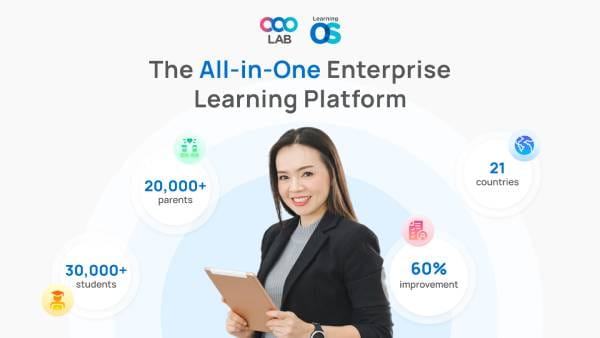In the ever-evolving landscape of education technology, the Learning Management System (LMS) plays a pivotal role in shaping the learning experience for students worldwide. As we step into 2024, the quest for the ideal LMS intensifies, with educators and institutions seeking platforms that not only facilitate seamless course delivery but also enhance student performance.

Canvas, Blackboard, and LearningOS - three giants in the realm of LMS, each vying for the title of the ultimate catalyst for academic success. With their array of features, user-friendly interfaces, and promise of innovative pedagogical tools, these platforms have revolutionized the way education is delivered and consumed. However amidst the competition, the burning question remains: which LMS reigns supreme in boosting student performance in 2024? In this comprehensive exploration, we will dive into the intricacies of Canvas, Blackboard, and LearningOS, dissecting their features and the unique value propositions they bring to the table.
I. Product Overview
1. Blackboard
Blackboard is a commonly-used Learning Management System (LMS) which has been a cornerstone of digital education for decades. At its core, Blackboard serves as a centralized hub where educators can create, manage, and deliver course content to students, fostering an interactive and engaging experience. From posting assignments and announcements to facilitating discussions and administering assessments, Blackboard offers a plethora of functionalities designed to streamline the educational process.
Blackboard Learn is tailored to 4 different markets: K-12, higher education, business and government. Blackboard Learn offers the same features to 4 markets which includes assignments/testing, discussion boards, messaging systems, user learning profile and virtual classrooms.
2. Canvas
Canvas, an innovative Learning Management System (LMS) created in 2011, stands as a beacon of modernity in the realm of digital education. Developed by Instructors, Canvas has swiftly risen to prominence, captivating educators and students alike with its intuitive interface, robust features, and commitment to enhancing the learning experience.
With the focus on K-12 and higher education, one of Canvas's standout features is its emphasis on communication and collaboration. Through built-in tools such as discussion boards, messaging systems, and collaborative documents, Canvas fosters meaningful interactions between students and instructors, cultivating a sense of community and engagement within the virtual classroom.
3. LearningOS
LearningOS, crafted by OOOLAB, is a comprehensive platform tailored by educators for educators, specifically addressing the needs of enrichment organizations. It provides a trio of invaluable services: Content Management System (CMS), Learning Management System (LMS), and Virtual Learning Environment (VLE), all aimed at optimizing learning operations within organizations.
With a suite of exceptional tools including Content Authoring, Scheduling and Booking, and Personalized Pathway, LearningOS has garnered the trust of numerous educators, learners, and organizations alike. It stands as a trusted ally for streamlining learning processes and enhancing educational experiences.
II. What are the main differences amongst Blackboard, Canvas and LearningOS
Let's go over some of the main features of these 3 LMS and see how each of them differentiate from others.
1. Reporting and Analytics
Blackboard
Apart from Blackboard Analytics, which enables both administrators and learners to gauge their performance in a particular class or program, there are two additional solutions geared towards aiding higher education institutions in tracking various metrics such as enrollment, financial aid, and accreditation. These solutions include Blackboard Intelligence, which serves as a business intelligence tool, and Blackboard Assessment and Accreditation.
Canvas
Canvas LMS has introduced a fresh feature named New Analytics through LTI, enabling educators to monitor course grades, weekly engagement rates, and attendance through visual graphs or data tables. For more sophisticated functionalities, Instructor's Elevate K-12 Analytics (formerly known as Videri) software amalgamates real-time data from various sources such as School Information Systems (SIS), learning management systems, and attendance records into a unified platform.
LearningOS
LearningOS offers a comprehensive range of analytics tailored for online and hybrid learning, including widely-used metrics. Additionally, we provide the option for custom learning analytics for an extra cost. Student users can view analytics pertinent to their learning progress, while administrators enjoy access to supplementary analytics. Reports are promptly updated on our cloud-based LMS platform. Furthermore, all analytics data can be easily downloaded in a .csv file format, containing user data for all LearningOS users.

Bottom Line
Although all three LMS offer similar analytic features, LearningOS and Blackboard allow learners to measure their course performance while Canvas does not
>>> Read more: K-12 LMS: 4 Learning Analytics that tell you your students need support
>>> Read more: Self-Paced Learning: Empowering Employees to Upskill at Their Own Speed
2. eLearning
Blackboard
Engaging in eLearning via Blackboard entails accessing educational content, participating in discussions, submitting assignments, and interacting with instructors and peers through the Blackboard platform. This digital learning environment facilitates remote learning by providing a central hub where course materials, resources, and communication tools are easily accessible.

Students enrolled in eLearning courses on Blackboard can navigate through their courses, access multimedia content, and complete assignments at their own pace. They can engage in discussions with classmates and instructors through forums and messaging features, fostering collaboration and interaction despite physical distance.
Canvas
Engaging in eLearning through Canvas offers students and instructors a dynamic and intuitive platform for remote education. Within Canvas, students have access to course materials, assignments, discussions, and collaboration tools, all organized in a user-friendly interface.
Students participating in eLearning on Canvas can easily navigate through their courses, access multimedia content such as videos and presentations, and interact with their peers and instructors through discussion boards and messaging features. Canvas facilitates asynchronous learning, allowing students to engage with course materials and complete assignments at their own pace while still fostering communication and collaboration.
LearningOS
LearningOS provides robust eLearning resources designed to create engaging and tailored learning environments. Notably, it boasts a potent content authoring feature, H5P Course Creator, seamlessly integrated into the platform. With this tool, users can incorporate interactive content directly into their courses, offering a wide array of interactive elements, activity options, assessments, and content management capabilities.
Students engaged in eLearning by LearningOS can effortlessly explore their courses, accessing a variety of multimedia resources like videos and presentations. They can also communicate with peers and instructors using discussion boards and messaging tools. LearningOS supports different learning styles, including asynchronous, blended, and self-paced learning, enabling students to interact with course materials and finish assignments at their convenience while still promoting communication and collaboration.
>>> Read more: What is H5P and How can it help YOU
>>> Read more: Transforming Apollo English's learning experience for over 30,000 learners with eLearning
Bottom Line
All these three LMS have tools to support eLearning. Nowadays, eLearning plays an important role in the education industry. Therefore, LMS implementation is the backbone of any educational institution.
3. Content Digitization
Blackboard
Blackboard excels in digitizing and managing educational content, providing a comprehensive platform for instructors to create, organize, and deliver course materials in a digital format. Through Blackboard, instructors can upload various types of content such as documents, presentations, videos, and multimedia resources, making them easily accessible to students.
Canvas
In Canvas, instructors can easily upload various types of content, including documents, presentations, videos, and multimedia resources, making them accessible to students from anywhere with an internet connection. The platform offers intuitive tools for organizing content, allowing instructors to structure courses into modules, units, or topics for efficient navigation.
LearningOS
LearningOS aids in converting learning materials into digital formats, enhancing accessibility and improving the learning experience for students. It particularly focuses on digitizing content for enrichment and corporate training purposes. By transforming non-interactive resources into engaging content, LearningOS revitalizes learning materials. Moreover, it centralizes all physical resources for streamlined access and breathes new life into corporate training initiatives.
Bottom Line
All these LMS allow educators to upload content digitally. However, LearningOS specifically focuses on digitizing content for enrichment and corporates.

Freshen up your content, let's talk about digitizing your sources
4. Automation
Blackboard
Blackboard Learn offers various automation features to streamline administrative tasks and enhance the teaching and learning experience. Here are some common automation features found in Blackboard Learn such as Course Copy and Templates, Adaptive Release, Assignment and Test Developments, Grading Rubrics, Discussion Board Management,...

Canvas
Canvas offers several automation features to streamline administrative tasks and improve the teaching and learning experience. Here are some key automation features available in Canvas LMS such as: Scheduler, Module Requirements and Prerequisites, Quiz and Assessment Setting, and Integration with External Tools,...
LearningOS
LearningOS leverages automation solutions to streamline learning operations for management, administrators, and instructors.
Through cloud-based content management, teams can collaboratively upload, organize, and oversee content.
The platform also empowers educators with proactive teaching methods through content delivery features.
Scheduling and Booking tools simplify class and schedule management for administrators and instructors.
Content Authoring is facilitated through the integration of H5P, enabling swift and effortless content creation without the need for coding.
By automating various processes, LearningOS reduces time and expenses, unlocks potential revenue streams, and elevates user engagement and retention.
>>> Read more: How can an LMS help automate my learning operations?
Bottom Line
LearningOS surpasses the other two LMSs by excelling in cloud-based content management and incorporating H5P integration, while all of them provide automation tools for easing administrative tasks.
5. Gamification
Blackboard
Blackboard Learn, like many learning management systems, supports gamification features to enhance student engagement and motivation. While Blackboard Learn does not have built-in gamification features as robust as some other platforms, instructors can still incorporate gamification elements into their courses using various tools and techniques. Here are some ways gamification can be implemented in Blackboard Learn: Badges and Achievements, Leaderboards, Points and Rewards, Quests or Missions, …..
Canvas
Canvas LMS provides several options for incorporating gamification elements into courses to enhance student engagement and motivation. Here are some ways gamification can be implemented in Canvas: Badges and Certificates, Points and Leaderboards, Mastery Paths, Collaborative Activities, Progress Tracking, Assignments,....
LearningOS
Gamification within LearningOS encompasses diverse content formats, ranging from quizzes and challenges to interactive videos, and it enables the integration of third-party tools.
In addition to standard automation functions found in other LMS platforms, LearningOS introduces customizable digital currency. Users have the flexibility to select from various options like coins, stars, or gold, which they can allocate upon finishing tasks, homework, or assessments. Administrators have the capability to establish a reward shop where students can utilize their earned currency. This shop can be stocked with educational resources or corporate merchandise. These two standout automation capabilities distinguish LearningOS from other LMS offerings.
Bottom Line
Within these three LMSs, gamification is implemented. LearningOS introduces unique features like customizable digital currency and a reward shop, which are relatively unexplored by many developers in this field.
>>> Read more: The Benefits and awesome features of LMS gamification
III. Conclusion
Below, you'll find a comparison of Blackboard, Canvas, and LearningOS. We hope this overview assists you in selecting the optimal LMS to suit your requirements. As we enter 2024, the importance of digitally revolutionizing teaching and learning cannot be overstated. The advantages it brings are numerous, benefiting learners, educators, and even the business aspects involved.
If you find this article helpful, please explore additional content on our OOOBlog
-----------------------
About us
At OOOLAB (pronounced 'uːlæb'), our mission is to make complex learning operations simple. We aim to positively impact the lives of over 1,000,000 learners and educators by the end of 2026.
OOOLAB's LearningOS provides educational institutions and corporate enterprises with an all-in-one solution to create and deliver engaging learning experiences.
Reach out to us at: Linkedin, FaceBook


